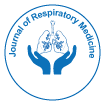Symptoms and Causes of Asthma
Received: 01-Nov-2021 / Accepted Date: 15-Nov-2021 / Published Date: 22-Nov-2021
About the Study
Asthma is a lung inflammatory disease that lasts for a long time. Variable and recurring indications, reversible airflow blockage, and unprovoked bronchospasms are all symptoms. [Wheezing, coughing, chest tightness and shortness of breath are some of the symptoms.] There may also be certain occurrences that occur on a weekly basis. Bronchial allergy symptoms may become worse at night, depending on the individual. Asthma is thought to be caused by a combination of genetic and environmental factors.
Exposure to air pollution and allergies are examples of environmental factors. Medications such as aspirin and beta blockers are examples of capacity triggers. The diagnosis is made based on a collection of symptoms, the patient's response to treatment over time, and spirometer lung feature testing. Asthma is classified based on the frequency of symptoms, the pressurized expiratory volume in a single second (FEV1), and the peak expiratory drift rate. It will also be classified as atopic or non-atopic, with atopy referring to a susceptibility to develop an allergic reaction of some sort.
are not untreatable. Symptoms can be avoided by avoiding triggers like as allergens and breathing irritants, as well as suppressed by using inhaled corticosteroids. If bronchial allergy symptoms persist, longacting beta agonists or anti-leukotriene sellers might be added to inhale corticosteroids. Inhaled short-acting beta-2 agonists such as salbutamol and oral corticosteroids are commonly used to treat rapidly increasing symptoms. Intravenous corticosteroids, magnesium sulphate, and hospitalization may be required in severe cases. Bronchial allergies afflicted around 262 million people in 2019 and resulted in 461,000 fatalities. The majority of the deaths occurred within the expanding world. Asthma often begins in childhood, and the costs have risen dramatically since the 1960s. Asthma was detected as far back as Ancient Egypt. "Bronchial allergies" is derived from the Greek term ásthma, which means "panting."
Symptoms
Recurrent episodes of wheezing, shortness of breath, chest tightness, and coughing are all symptoms of asthma. Coughing can cause sputum to build up in the lungs, but it's often difficult to get rid of. Excess levels of white blood cells known as eosinophil’s can make it appear pus-like during recovery from a bronchial allergy attack (exacerbation). The symptoms are usually worse at night and early in the morning, or in response to bloodless air. Some people with bronchial allergies experience symptoms only sometimes, usually in response to triggers, whereas others may experience symptoms frequently and without difficulty.
Causes
Asthma is caused by a complex web of environmental and genetic interactions that are yet poorly understood. These factors have an impact on the severity of the condition as well as how well it responds to treatment. The recent increased rates of bronchial allergies are thought to be due to changing epigenetics (heritable elements other than those linked with the DNA sequence) and changing living conditions. Asthma that develops before the age of 12 is considerably more likely to be caused by genetic factors, but asthma that develops beyond that age is far more likely to be caused by environmental factors.
Prevention
The proof for the effectiveness of measures to save the improvement of bronchial allergies is weak. The World Health Organization recommends reducing hazard elements inclusive of tobacco smoke, air pollutants, chemical irritants consisting of perfume, and the wide variety of breathing infections. Other efforts that display consists of: restricting smoke publicity in utero, breastfeeding, and extended publicity to daycare or massive families, however none are nicely supported sufficient to be advocated for this indication.
Early publicity for puppies can be beneficial. The results of exposure to dogs at various times are ambiguous, and it's far better advised that pets be removed from the house if someone has allergic symptoms.
Dietary restrictions during pregnancy or breast-feeding have not been proven to be effective in preventing bronchial allergies in children and are not recommended.
Reducing or eliminating compounds that are thought to irritate sensitive people from the painting area can be effective. It's not always clear whether or not annual influenza vaccinations reduce the risk of exacerbations. Immunization, on the other hand, is recommended by the World Health Organization. Smoking prohibitions are effective in lowering bronchial allergy flare-ups.
Citation: Kader AR (2021) Symptoms and Causes of Asthma. J Respir Med 3:117
Copyright: © 2021 Kader AR. This is an open-access article distributed under the terms of the Creative Commons Attribution License, which permits unrestricted use, distribution, and reproduction in any medium, provided the original author and source are credited.
Share This Article
Recommended Journals
Open Access Journals
Article Usage
- Total views: 1426
- [From(publication date): 0-2021 - Mar 31, 2025]
- Breakdown by view type
- HTML page views: 956
- PDF downloads: 470
